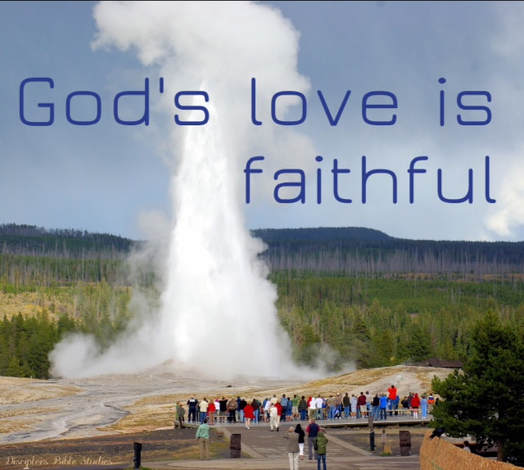 I would like to introduce you to Joel, the second of the Minor Prophets. The only thing we know for sure about Joel, aside from the fact that he wrote this prophecy, is that his father's name was Pethuel (Joel 1:1). Someone has mentioned that God picked an unknown man like Joel to deliver this particular prophecy because the message itself is so important, and He didn't want people dwelling on the one who delivered the message, but on the message itself. Indeed, Joel's prophecy is one that everyone needs to hear and heed. So I want to share with you why I believe that is true. The first thing that may stand out if you read Joel's prophecy is that his main subject seems to be "the day of the Lord". He mentions the day of the Lord six times in three short chapters, and twice he describes it as “great and terrible”. Joel began his prophecy by describing in detail a devastating locust plague that had recently destroyed the land of Judah. He describes what the locusts had done to the fields, the grain, the vineyards, the trees, and how the people had been affected. He saw the locust plague as God's judgment on Judah and called the people to repent. The locust plague, he said, was a warning of greater judgment to come unless the people turn from their sin and return to God with all their hearts (Joel 2:12-13). It won't be enough to just say "sorry", expect God to forgive their sin, and then go on living the same sinful lives, following the ways of the pagan nations and worshiping their gods rather than following and living for the one true God. So Joel grabs the attention of the people, and hopefully our attention as well, by saying this locust plague is just a small taste of the great and terrible day of the Lord that is coming. Then He describes that day. There will be signs in the heavens and the heavens and earth will be shaken. It will be a solemn day of judgment. God will judge all nations (and people) who have denied and defied Him. All those who have made the decision to rebel against Him and refused to repent will be gathered to the "valley of decision" where they will receive God's decision of judgment. But the day of the Lord will also be a day of grace for God’s people. Those who have truly repented of their sin and love and obey God will not be judged but will rejoice in the strength, security, and blessings of God. Many people who read Joel's prophecy get caught up in the drama of the day of the Lord and search the Scriptures to find out more or read books to see what others have to say about it. This is all well and good unless they forget to look for the main point Joel is making. His reason in proclaiming the day of the Lord is to give us the opportunity to make sure we will not be among those being judged on that day. The heart of Joel's prophecy is in Joel 2:12-14, his call to turn to the Lord with all your heart, rend your heart and not your garments, and repent and return to Him. God is gracious and merciful and does not desire that any should perish (2 Peter 3:9), but He is also holy and just. And while He may allow evil to continue for a while, He will not tolerate it forever. The day of the Lord is coming. We don't know when it will be. Joel didn't know. None of the prophets knew. Jesus told His disciples that no one knows except God (Matthew 24:36). The apostle Paul wrote, in his first letter to the Thessalonians that the day of the Lord will come like a thief in the night and take many by surprise (5:2-3). But he also wrote, God did not appoint us to wrath, but to obtain salvation through our Lord Jesus Christ (5:9). Joel, hundreds of years before Paul wrote, told us how to make sure we do not face God’s wrath in judgment. Joel made clear that regret and remorse is not enough when it comes to dealing with sin. Repentance is needed. Joel says repentance is not just throwing out your old clothes and putting on clean ones. God calls for true repentance, which means grieving over your sin, turning to Him and giving Him your heart to cleanse and change so you can love Him, follow Him, and obey Him with every fiber of your being. Repentance begins deep inside us. As I was studying in preparation for writing a new Disciplers study on Joel, I came across these thoughts on the day of the Lord by Jack Wellman (patheos.com): “Today is the best day to repent and be saved if you haven’t already done so, for the Day of the Lord could come today while you’re reading this, tonight in your sleep, or if you were to die, the very next moment of your consciousness.” My prayer is that you will take Joel’s message to heart, and use it, as the writer of Hebrews says, to encourage on another daily, while it is called "Today", lest any of you be hardened through the deceitfulness of sin (3:13). With love, Suzie
0 Comments
 Have you ever read the Minor Prophets, those twelve books of prophecy that are tucked away at the end of the Old Testament? Oftentimes, they are my favorite place to linger in the Bible. But I think the name Minor Prophets is a little misleading because, when you take the time to read what they have to say, you discover they have some major truths to tell and major lessons to teach -- and not just to the Jewish people who were the original recipients. I see this as being especially true of the very first Minor Prophet, Hosea. Hosea is extra special because he did not just speak his prophecy to the people or just write it down. He lived it. And his experiences touch my heart because they tell of God's love. Sometimes we think of God as being so far beyond us that we don’t consider that He may have feelings. We always hear that “God is love”. But we need to remember that if God is love, it means God loves. In fact, the Bible says God loves us. The prophecy of Hosea, through Hosea’s life, illustrates the depth of what that means. Hosea’s story begins when God tells him to go and marry a harlot (prostitute) named Gomer. Hosea obeyed God, He married Gomer, and they had three children together. But then Gomer left Hosea and went back to her old way of life. She degraded and debased herself until she reached the absolute lowest place any woman possibly could. She reminds me in a way of the prodigal son who ended up living and eating with the pigs before he came to his senses and went back home to his father (Luke 15:11-22). But Gomer didn’t go back home - not until God told Hosea to go find her - in her misery, filth, and poverty - and take her back home. And Hosea did. Are you getting the picture? Hosea’s life was a picture of God and His love relationship with His people, Israel. God called them to be His people and He made them a nation. He gave them a land flowing with milk and honey, and was with them always. But Israel was a harlot, just like Gomer. They chased after the gods of the pagan nations. They made their own gods of wood and bronze and gold and worshiped them instead of worshiping the one and only true God who had created the heavens and the earth. Not only that, He had created them and chosen them to be His special people out of all the other peoples on the earth. He loved them and gave them laws to follow so they could fellowship with Him and live happy and productive lives. But they turned their backs on Him because they wanted to be like the pagan nations that surrounded them. So they worshiped the pagan gods and lived lives of sin. How ungrateful can you get? Well, we just might know a bit about that. God has blessed every person on this planet with the beauty and comfort of majestic mountains, verdant valleys, and amber waves of grain. He has given us oceans and rivers and gurgling brooks. He sends the rains in their season and winds to cool us on summer evenings. The sun rises every morning to give light and warmth to our days and the moon and stars sparkle in the night skies. God has given us life itself! But how many people on our planet even acknowledge these things? And its worse for those of us who know Him and have been blessed with His Word and His calling to be His. How often do we ignore Him and go after our own worldly pursuits and break His heart as the Israelites did? The prophecy of Hosea is about the sins of Israel and the extent to which God called Hosea to go to point out and illustrate those sins to them. But even more, the prophecy of Hosea is about the love of God and the anguish it causes Him when His people reject His love, disdain His laws, and embrace the sins of the world. The most beautiful thing about the prophecy of Hosea is the last chapter where we learn that in spite of Israel’s sin and God’s hurt and wrath, He never stops loving His people and promises to restore them in the end. God’s love is faithful in spite of our unfaithfulness. God’s love never fails even when we fail God. The first time I read Hosea and saw the enduring power of God’s love in the face of His people’s sin, my conscience led me re-examine my life, because I don’t want to be like the Israelites who took God for granted, disrespected His laws, and made themselves comfortable in the pagan world. So I asked myself, does my heart follow after my maker or things that are made? Do I live the life of a secular person and then turn to God when when things go wrong and expect Him to be there for me? Is God my treasure? Do I spend quality time with Him, in His Word, or do I fritter away my time on worldly “treasures” that tempt me to fill my day -- things like Facebook, Twitter, movies, politics, gossip with the girls or hanging out with the guys at the gym or bar? What is your favorite pastime? How much time do you spend seeking and listening to God? Thank you, Hosea, for waking me up to see what my unfaithfulness does to the heart of God and how it undermines and brings me down to be a Gomer. Thank you Hosea, for your example of faithfulness to God even though your faithfulness to God fashioned your whole life in a way that brought you hurt and heartache. I want to remember your testimony always and I want it to make me a more thoughtful and intentional person. Like Hosea, God made me and called me for a purpose and I want that very purpose to be fulfilled in my life. He made and called you too and has a particular purpose for you. I hope you will take twenty minutes from your day to read the Book of Hosea with a heart open to God and open to hear what He is saying to you through Hosea’s story. God loves you faithfully, and if you love Him you must be faithful too. with love, ~Suzie |
SUZIE KLEIN
I have been involved in Disciplers since 1987, as a discussion leader, teacher, writer, and now as director. I am profoundly committed to the stewardship of this ministry which God has entrusted to me for a time. God’s word is the chief joy of my life. I cherish my personal time in the word, and I am filled with gratitude to be able to share His word with you, my fellow disciples in Christ. Categories |

 RSS Feed
RSS Feed